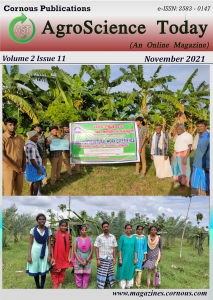Sugarcane crop is commercially cultivated across the country. Uttar Pradesh state has approximately 23 lakh hectare sugarcane area of the 50 lakhs sugarcane area of the country. In recent years, this state has achieved a better position in sugar production in the country. During sugarcane cultivation, farmers are applying quantum chemical fertilizers besides the recommended dose of fertilizers. The recommended dose of fertilizers for sugarcane cultivation in the sub-tropical region of the country is in the ratio of 150:60:60 (N,P,K). Phosphatic and potassic fertilizers are applied at the time of planting as a basal application. Only one-time application is done to fulfill the requirements of these plant nutrients. Nitrogenous fertilizers are applied in three split doses and advised to be used within 90 days of the crop or before the onset of the monsoon. To reduce our dependency on phosphatic fertilizers, minimize the cost of cultivation as well as enhance crop yield, a phosphate solubilizing microbial product named Ikshu PSB was developed and validated in experimental trials. Field level demonstrations were conducted at ICAR-Indian Institute of Sugarcane Research, Lucknow, and Farmers Field of Lakhimpur district, Uttar Pradesh. It was recorded that Ikshu PSB treated field had better cane yield. The increased cane yield was 23.74 percent higher than the standard control. Based on this, net income was calculated and found a 57.67 percent increase compared to non-treated fields. The monetary return was also 24.41 percent higher. Besides this, it was noticed that crop loss caused by biotic factors mainly due to diseases was negligible in treated fields. While some borer damages were noticed by in both treated and non-treated fields. The technology was demonstrated to sugarcane growers, students, and researchers during various institutional activities. The technology has been commercialized with a private agency for its mass multiplication and distribution to the benefit of sugarcane growers in the subtropical regions of the country.
Organic farming is a much needed step for our present and future generation. Organic farming is a strategy which is adopted to protect the human's birds and our environment through sustainable agriculture. Organic farming helps to keep out the chemicals from the farm and curtail the use of inorganic fertilizer. It is a high time that farmers should start to adopt organic farming. Organic agriculture has fewer yields but it enhances the quality of what we consume.
Minor millets consist of a group of small seeded cereal species that are genetically diverse and adapted in varied range of agro-climatic conditions where major cereals such as rice, wheat and maize were relatively uneconomical. Millets played an important role in traditional farming and food culture in many developing countries like South Asian and African countries. Minor millets include fingermillet (Eleusine coracana L.), foxtailmillet (Setaria italica L.) Beauv), prosomillet (Panicum miliaceum L.), kodomillet (Paspalum scrobiculatum L.), barnyardmillet (Echinochloa frumentacea Roxb., Link) and littlemillet (Panicum sumatrense Roth.ex Roem. and Schultz).
RHWE- Rural horticultural work experience it is a programme which provide exposure to horticulture students by settling down in an allotted village working with farm families and identifying the problems in agriculture / horticulture crop production and providing recommendation to the farmers RHWE prepares horticultural graduates for better career in horticulture/horti business management. RHWE also helps horticultural graduates to face challenges by accruing knowledge and skills through hands on experience.
The raising demand for nutritious healthy intake has led many entrepreneurs to give a shot on growing fruits like Apple, Dragon fruit, Date palm, Tissue culture Teak and Coconut in Tamil Nadu. Apple cultivation, long associated with the Himalayan foothills is heading south to the tropics. India is the largest importer of dates in the world. Cultivation of Date palm in India is very limited. Now Date palm can also be grown in the southern tropics. With the suitable varieties, a farmer can grow any crop anywhere. The time has come for the farmers to move forward with different crops.
Lavender (Lavandula spica) is an ornamental plant economically valued for its highly fragrant flower. Lavender oil extracted from flowers is an important ingredient in many commercial products. Cultivation of lavender in the hills of Jammu has changed the face of farming and brought in scent of profit to farmers. Aroma mission launched by Council of Scientific and Industrial Research (CSIR) in 2016 envisaged to bring transformative change in the aroma sector through interventions in the areas of agriculture. It is expected to enable Indian farmers and aroma industry to become global leaders in the production and export of essential oils.
